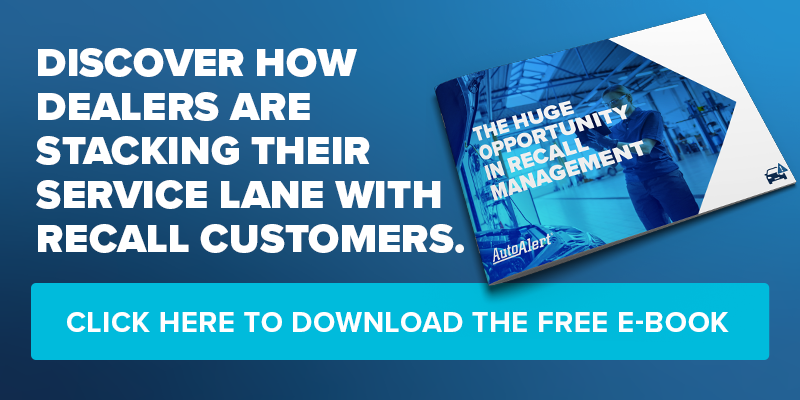Why Recall Management Is Working TODAY for Dealerships (Part 2): 3 New Ways to Sell Cars on the Service Drive
August 31, 2020
In Part 1 of our two-part series on Recall Management, we looked at why the timing is perfect for correcting safety recalls as a service. We also discussed why this approach will always be useful for dealerships, even post-Covid – because it is customer-centric and brimming with opportunity.
Dealerships across the country shared that Recall Management is providing them with the perfect chance to reconnect with their customers and foster goodwill. And because recalls will always be a reality – and are even increasing in recent years – they will always be a resource from which dealerships can draw.
“The industry been waiting for a good solution for what to do with the recall epidemic that’s happening across the country,” says Rick Ricart, President of Ricart Automotive Group. “From a dealer’s perspective, any visit to the dealership is something we want. That’s Marketing 101. Being able to start with the recall is perfect timing, and something we need right now.”
Today, we’ll look at more precisely how dealerships are using Recall Management to succeed.
3 Ways to Sell More Cars Using Recall Management ...
1. Get started on the right foot.
Getting started on the right foot pertains as much to the dealership as to the customer. What this means is that a conversation that starts with helping the customer, at no cost to the customer, is going to be good news for the customer – it’s getting started on the right foot for them. But what makes it getting started on the right foot for the dealership?
We’ve already looked at how customer centricity and relationship-building are natural components of Recall Management, but the good news doesn’t end there. The process also allows dealers to narrow their focus to customers who are more likely to continue doing business with them.
For example, instead of randomly calling their entire list of recall customers (some dealerships are reporting 15,000+ recalls), dealers seeing the most success are focusing on customers who live within a certain radius of the dealership. Some are calling customers that AutoAlert analytics indicate are “in-market,” giving them the opportunity to swap keys when they do come in – and maybe even get a lower payment at a time when monthly costs matter more than ever.
We’re back to talking benefits to the customer. That’s how win-win of a process Recall Management is – the benefits to the dealership and to the customer are inherently connected.
2. Continue the personalized conversation and plant seeds.
Now that you have a grateful customer coming into your service drive to get their recall completed, it’s important to nurture the long-term opportunity. This requires keeping your team on the same page with every customer, so that each conversation makes the most sense and meets each customer’s unique, changing needs.
For some, you’ll simply want to resolve the recall. Rely on AutoAlert to give you all the data you’ll need on every customer (whether they’ve purchased from you or not) as well as talk tracks. You’ll even know which employee should handle each step with the customer, to ensure a seamless, speedy experience.
“[I]t’s great because we can call and invite them into the dealership so we can help them get their car repaired through the recall,” says Terry Miller, Vice President and GM of Gary Crossley Ford in Kansas City. “And while they’re here, we’ll offer them some options to go home and think about in regard to replacing their vehicle with a new one.”
For Bob Wheat, General Manager of Village Ford in Detroit, Recall Management means new conquest opportunities.
“It gives us a tremendous opportunity, especially to go after a lot of visiting owners,” Wheat says. “We’re in a location where we’ve got a lot of people working, but then they buy in their bedroom communities. And they come to us for service. So this gives us a lot of visiting owners. As we service their vehicles and do the recalls it gives us the opportunity to go after those folks and talk to them about the possibility of buying from us next time.”
3. Become “top of mind.”
The late poet and civil rights activist Maya Angelou famously said, “At the end of the day, people won’t remember what you said or did; they will remember how you made them feel.”
When it comes to how your customers feel in regard to having their recall corrected by your dealership, at no cost to them, there’s no question that it’s going to be positive. And, although the amount of stress everyone is under has been amplified during the coronavirus pandemic, it’s always true that people appreciate when you reach out to help them. They’ll remember it too.
They might even talk to their family and friends about it. Especially because the service is in direct contrast to the unfavorable reputation that dealerships have been given over the years, with most consumers preferring a trip to the dentist over a trip to the dealership. But Recall Management can help change that, by positioning you and your team as forward-thinking and helpful.
Part of the Bigger Picture
It’s always the right time to build relationships with your customers. With Recall Management, dealerships are given a great way to do this, even during very challenging times.
And because the process is just one part of a customer-centric platform that ensures each and every interaction with the customer is personalized and timely, your team avoids the risk of coming off as insincere or insensitive – hallmarks of spray-and-pray marketing.
Watch this video to learn more from dealers who are using Recall Management to contribute to their success every day.



